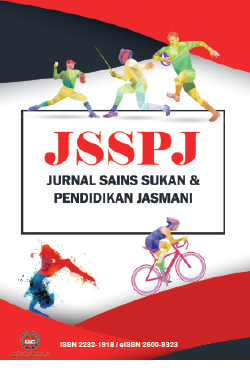The awareness of hydration knowledge on gender differences among UiTM Perlis athletes
DOI:
https://doi.org/10.37134/jsspj.vol10.1.6.2021Keywords:
Hydration, Knowledge, Gender, AthleteAbstract
Water is the human body's main constituent. Paucity of hydration can impair the sports performance of the athletes and cause heat problems which can harm the athletes. Therefore, maintaining proper hydration status is crucial for sports performance and general well-being of athletes. Previous study focused on hydration knowledge among difference participants and focused on one type of gender only. To date, no clear results on hydration knowledge between genders among university athletes. Therefore, the purpose of this study was to determine the hydration knowledge on gender differences among UiTM Perlis athletes. A total of 169 UiTM Perlis athletes (85 males and 84 females) were participated in this study. Athletes were asked to answer Hydration Awareness Questionnaire (HAQ) which consists of 13 items. This study utilized online survey questionnaires to assess athlete hydration knowledge. The results of this study indicate that there was no substantial difference (p <0.05) observed between genders in hydration knowledge. Despite understanding the importance of keeping hydrated, the awareness between genders on the hydration knowledge was on the average. Therefore, continued efforts must be made by coaches, managers and athletes to develop and implement more effective hydration strategies.
Downloads
References
Armstrong, L. E., & Armstrong, L. E. (2000). Performing in extreme environments (Vol. 1). Champaign, IL: Human kinetics.
Ashadi, K., Mirza, D. N., & Siantoro, G. (2018). Hydration status in adolescent runners: Pre and post training. IOP Conference Series: Materials Science and Engineering, 296(1). https://doi.org/10.1088/1757-899X/296/1/012014
Ashadi, Kunjung, Fachri, R. L., Siantoro, G., Kusuma, D. A., Hariyanto, A., & Kusuma, I. D. M. (2018). Comparison of Knowledge and Hydration Awareness on Adolescent Soccer Athletes. 157(Miseic), 5–8. https://doi.org/10.2991/miseic-18.2018.2
Cristobal, E., Flavián, C., & Guinalíu, M. (2007). Perceived e-service quality (PeSQ): Measurement validation and effects on consumer satisfaction and web site loyalty. Managing Service Quality, 17(3), 317–340. https://doi.org/10.1108/09604520710744326
Decher, N. R., Casa, D. J., Yeargin, S. W., Ganio, M. S., Levreault, M. L., Dann, C. L., ... & Brown, S. W. (2008). Hydration status, knowledge, and behavior in youths at summer sports camps. International Journal of Sports Physiology and Performance, 3(3), 262–278.
Ersoy, N., Ersoy, G., & Kutlu, M. (2016). Assessment of hydration status of elite young male soccer players with different methods and new approach method of substitute urine strip. Journal of the International Society of Sports Nutrition, 16–21. https://doi.org/10.1186/s12970-016-0145-8
Heaney, S., O’Connor, H., Michael, S., Gifford, J., & Naughton, G. (2011). Nutrition knowledge in athletes: A systematic review. International Journal of Sport Nutrition and Exercise Metabolism, 21(3), 248–261. https://doi.org/10.1123/ijsnem.21.3.248
Jenus, J. S., Pitil, P. P., & Wahed, W. J. E. (2018). Knowledge, Attitude and Behaviors Regarding Hydration and Hydration Status among Combat Sports Athletes. World Journal of Management and Behavioral Studies, 6(1), 7–10. https://doi.org/10.5829/idosi.wjmbs.2018.07.10
Jusoh, N. (2014). Relationship between hydration status, hydration knowledge and fluid intake behaviour among school athletes of selected Perak sport schools. Jurnal Sains Sukan & Pendidikan Jasmani, 3(1), 11–19.
Lopez, R. M. (2012). Exercise and hydration: individualizing fluid replacement guidelines. Strength and Conditioning Journal, 34(4), 49–54. https://doi.org/10.1519/SSC.0b013e318262e1d2
Magee, P. J., Gallagher, A. M., & McCormack, J. M. (2017). High prevalence of dehydration and inadequate nutritional knowledge among university and club level athletes. International Journal of Sport Nutrition and Exercise Metabolism, 27(2), 158–168.
Maughan, R. J., & Shirreffs, S. M. (2007). Nutrition and hydration concerns of the female football player. British Journal of Sports Medicine, 41(SUPPL. 1), 60–64. https://doi.org/10.1136/bjsm.2007.036475
Nichols, P. E., Jonnalagadda, S. S., Rosenbloom, C. A., & Trinkaus, M. (2005). Knowledge, attitudes, and behaviors regarding hydration and fluid replacement of collegiate athletes. International Journal of Sport Nutrition and Exercise Metabolism, 15(5), 515–527. https://doi.org/10.1123/ijsnem.15.5.515
Ortiz, E. (2019). Hydration Knowledge and Intake in High School Student Athletes. Master Thesis. Illinois State University, USA.
Sedek, R., Mohamad, M. M., & Kasim, Z. M. (2015). Knowledge, attitudes and practices on hydration and fluid replacement among endurance sports athletes in National University of Malaysia (UKM). Pakistan Journal of Nutrition, 14(10), 658. https://doi.org/10.3923/pjn.2015.658.665
Zhang, N., Du, S., Tang, Z., Zheng, M., Yan, R., Zhu, Y., & Ma, G. (2017). Hydration, fluid intake, and related urine biomarkers among male college students in Cangzhou, China: A cross-sectional study—applications for assessing fluid intake and adequate water intake. International Journal of Environmental Research and Public Health, 14(5). https://doi.org/10.3390/ijerph14050513





